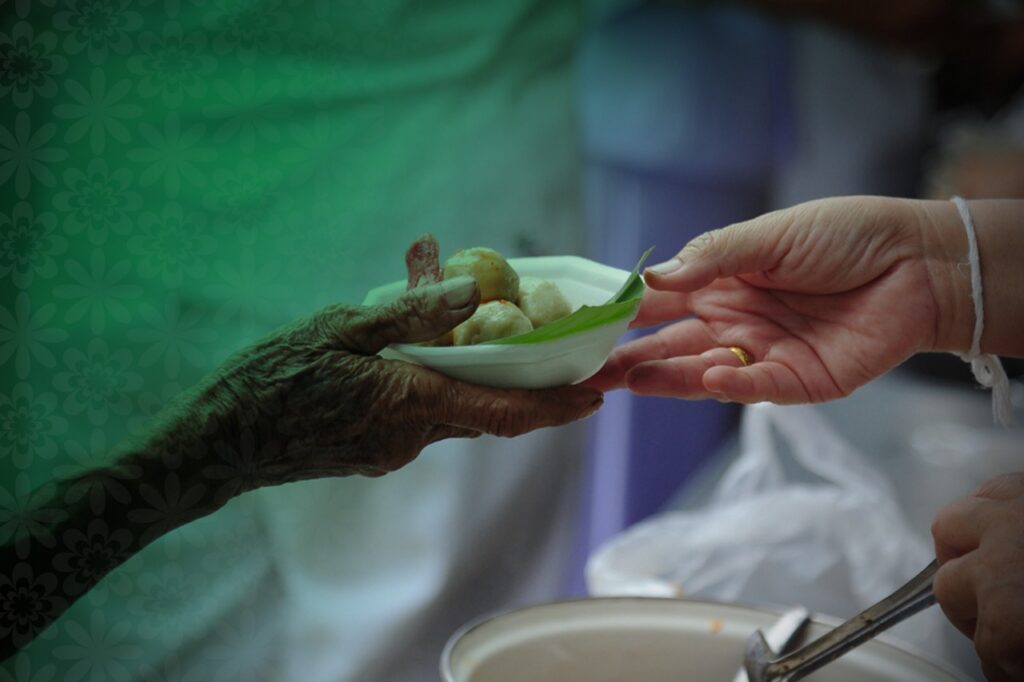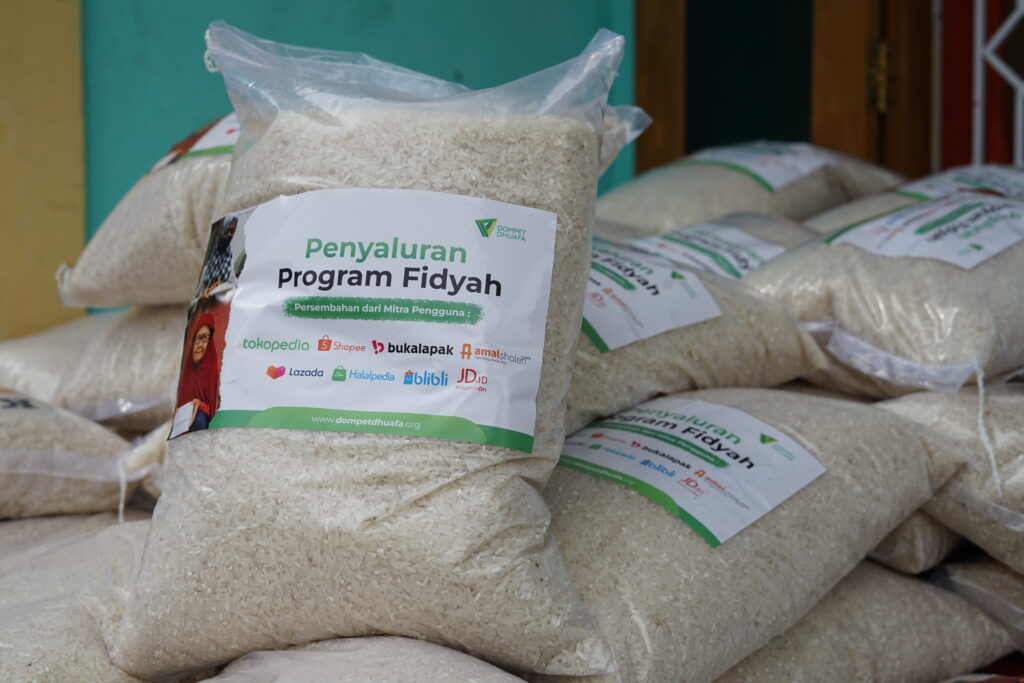Generally, people who leave the Ramadan fast are obliged to replace it with fasting later, outside the month of Ramadan. However, some people can also replace Ramadan fasting by paying fidyah. So, what is fidyah? Who are the groups of people who can pay fidyah to replace the Ramadan fast that they missed? Here is the explanation.
What is Fidyah?
The word fidyah is a term used in the context of redemption. The word fidyah comes from Arabic fadaa, which means giving property to redeem someone. The context of the fiddyah about the ransom-redeem is written in the Quran surah As-Saffat verse 107 when Allah Swt commanded the Prophet Ibrahim As to slaughter his son, Ismail As.
Baca juga: Apa Saja Amalan yang Dikerjakan Nabi Muhammad Saw di Bulan Ramadan?
But in general, the essence of fiddyah is to spend money or treasure to redeem something, for example, in the context of Ramadan fasting. Suppose a person renounces the obligation of fasting because of udzur syar’i (an obstacle that allows a person to leave the responsibility). In that case, he can replace it by paying fidyah and does not have to replace his fast.
So, who are the groups of people who can pay fidyah to replace the Ramadan fast?

Groups of People Who Can Pay Fidyah
In the Quran surah Al-Baqarah verse 184, Allah Swt allows a Muslim to replace his mandatory fast by paying fidyah. But at the end of the verse, Allah again emphasizes that trying to keep fasting is better than fasting or paying fidyah.
“Then whoever of you is sick or on the way (and he breaks his fast), then (he must fast) as many days as he left on other days. And it is obligatory for those who are strenuous to exercise it (if they do not fast) to pay fidyah (that is): to feed a poor man. Whoever willingly works for virtue, then that is better for him. And fasting is better for you if you know.” (QS. Al-Baqarah: 184)
Thus, fidyah is a form of God’s affection for his servant. Instead of punishing or burdening those unable to fast, Allah makes it easier by allowing a person to pay fidyah without paying the “debt” of his fast again. Here are the groups of people who can pay fidyah:
Baca juga: Ramadan Menghitung Hari, Persiapkan 4 Hal Ini Sebelum Puasa

· Elderly People
As is known, most elderly or elderly people have reduced their body functions and are getting weaker. Most of them are also no longer able to fast, so they are allowed not to fast and replace it by paying fidyah a certain number of fasting days left behind.
In addition, most elderly are also not required to fast because, logically, their physical condition will decrease with age. Therefore, religion does not burden them with burdensome obligations. The following is the argument that parents can pay fidyah:
“Recounting Ahmad ibn Abdillah the deputy of Abi Sakhrah, narrating Hussain ibn ‘Urfah, narrating Ruuh’, narrating Zacharias ibn Ishaq from Umar ibn Dinnar from Attha’, indeed I heard Ibn Abbas recite the verse (Al-Baqarah: 184). So he said: “The verse is not abolished by law, but applies to elderly men and women who can no longer afford to fast during Ramadan. Both are obliged to pay fidyah to a poor man for every day he leaves behind (not fasting).” (Ali ibn Umar Ad-Daruquthni)
· Pregnant and Lactating Women
Pregnant or lactating women are allowed not to fast and pay fidyah to replace their fast because it is feared that something will happen to the child they are conceiving or breastfeeding. However, several scholars differ in opinion on this subject. Some scholars say pregnant or lactating women must observe fasting and pay fidyah. Meanwhile, other scholars have stated that pregnant or lactating women can replace the fasting left behind by paying only fidyah.
Baca juga: Kapan Waktu Membayar Zakat Fitrah yang Seharusnya dalam Islam?

· The Sick Who Has No Hope of Recovery
A Muslim who suffers from illness and in his disease has no hope of recovery, so he can pay fidyah without having to observe his fast outside the month of Ramadan. It is based on a hadith narrated by Abdullah Ibn Abbas radhiyallahu ‘anhu. He explained:
“It is reported to us, Muhammad bin Ismail bin Ibrahim said; told us from Yazid he said; has conveyed to us Warqa’ from Umar ibn Dinar from Atha’ of Ibn Abbas radhiyallahu ‘anhu, about the Word of Allah Azza wa Jalla: “The verse (Al-Baqarah: 184) gives the understanding that one who is incapable of fasting, then he is allowed to redeem it with fidyah (feeding one poor man) and who can give more than one person, then it is better for him. The verse is not mandated by the verse afterwards, but it is not given leniency in verse (to pay fidyah), except for people who cannot fast or are sick for whom healing is difficult.” (Ali ibn Umar Ad-Daruquthni)
· Deceased People
The deceased belong to the class of people who can pay fidyah. However, the person who died here is him who still leaves the debt of fasting on two grounds. The first reason he left the fast was because of the presence of udzur syar’i, such as being sick. However, there was a possibility of recovery, so it was thought that he still had a chance to pray for him, but it turned out that until the qadha of his fast was carried out, his death had come first.
While the second reason is that he left fasting because of udzur syar’i, but until Ramadan was over, his condition did not improve, so it was still impossible to fast until his death. If so, the fiddyah obligation is imposed on the deceased’s family. They are obliged to pay the fidyah of the dead as much as the fasting day left by him or her.
· People Who Delay Paying Fasting “Debts”
Delaying paying Ramadan fasting debts is not recommended in Islam, let alone postponing until the next Ramadan. However, if in the delay, there is a reason for udzur syar’i, such as illness, then the person is allowed to postpone the payment of the fasting debt until the next Ramadan.
However, it is different for people who deliberately postpone paying the fasting debt of Ramadan until the next month of Ramadan without udzur syar’i. If a person intentionally does this, based on the jumhur of scholars of the four schools, the person is obliged to observe his fast and pay fidyah for the number of days of fasting left behind.
For the amount of fidyah and the deadline for paying fidyah, friends can read more about it here: Understanding Fidyah, Law, and Its Provisions According to Islam. Meanwhile, for friends who want to pay fidyah quickly, you can channel it through Dompet Dhuafa via the link below. Through Fidyah Dompet Dhuafa, Insya Allah fidyah, you will reach the beneficiaries who need and are entitled.



